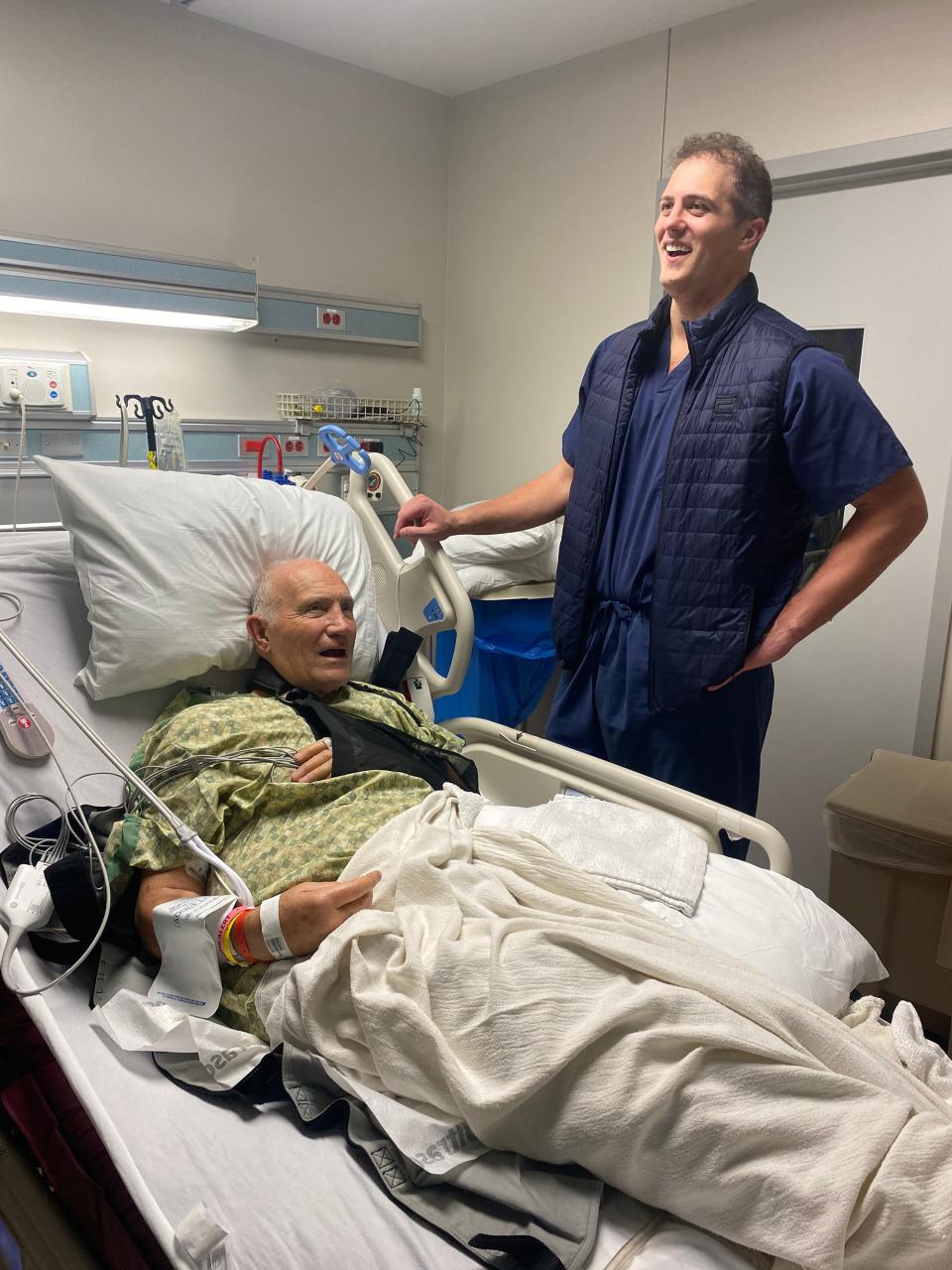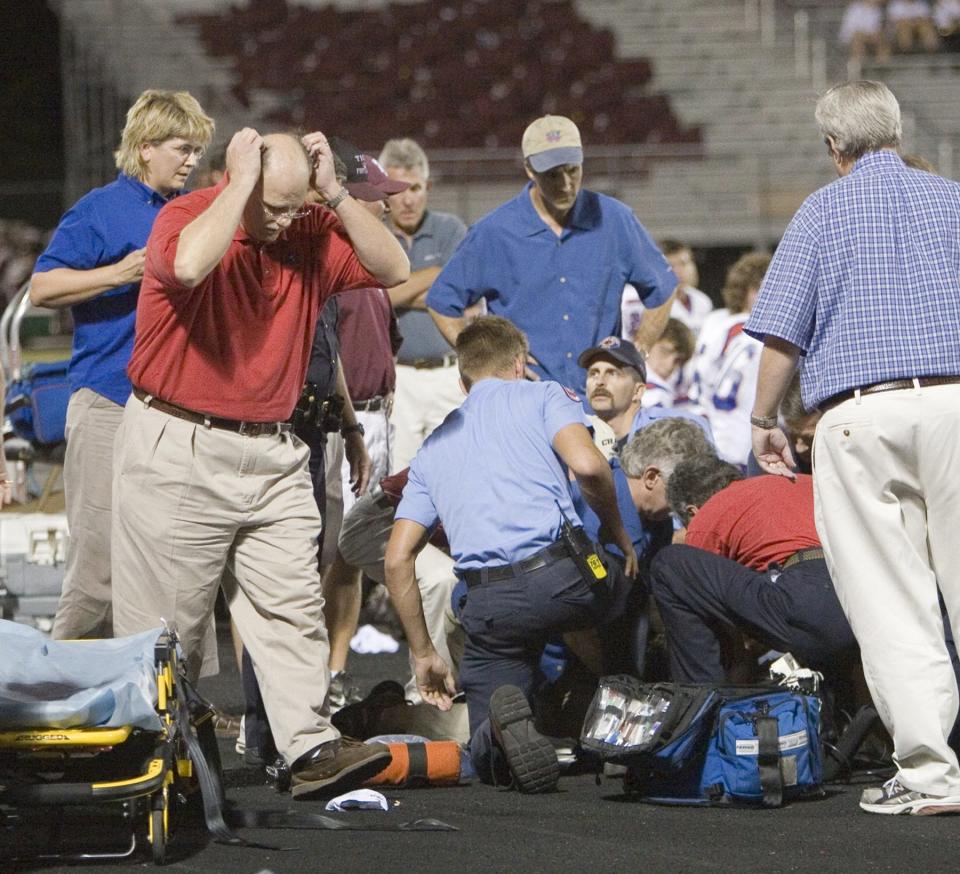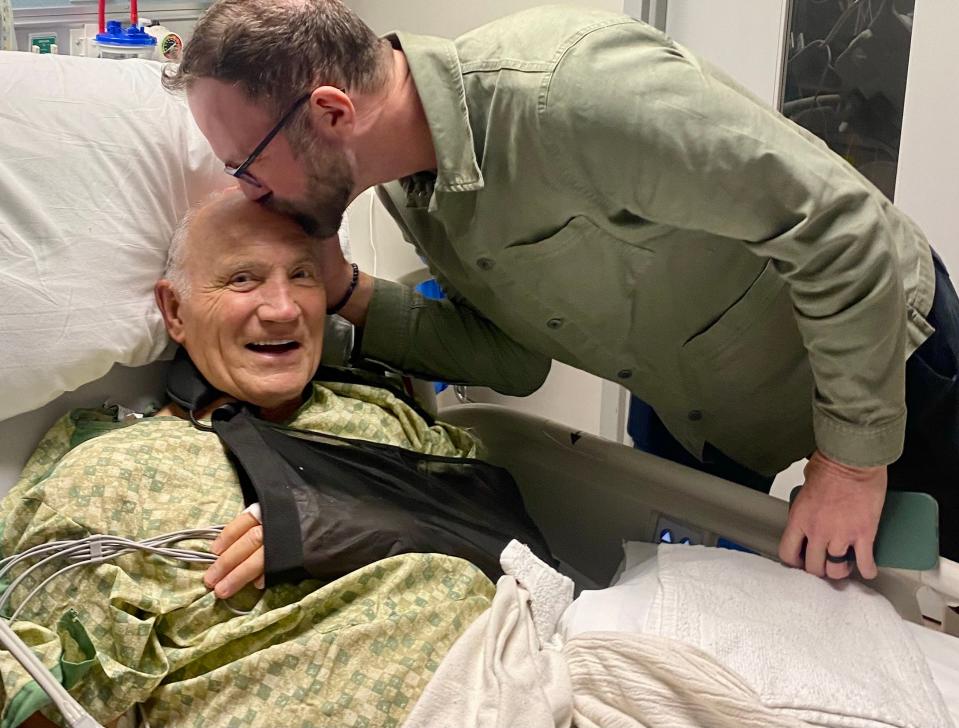17 years after Matt Nader's life was saved with an AED during a game, he returns the favor
Matt Nader was walking back to his car after Westlake's Class 6A state semifinal Dec. 9 in Pflugerville when he noticed an elderly man on his back in the parking lot.
Nader, the former Westlake and Texas offensive lineman whose life was saved 17 years ago when his heart stopped during a Chaparrals game, recalls hearing "a thud" before he turned to see Bill Wolters, 80, motionless on the black pavement. Blood was tricking from the back of Wolters' head. Gasps were heard from a crowd of bystanders who stood and stared.
Nader rushed toward the man and began cardiopulmonary resuscitation.
Wait, haven't we heard this story before?

At the right place. At the right time.
Nader, 34, is best remembered as the Westlake player whose heart stopped during a 2006 football game at hot and humid Tigerland Stadium in College Station. He was lucky that night. Some Westlake parents, including his own, happened to be doctors and rushed to the field during the game against A&M Consolidated. They performed CPR on the field to help him start breathing again, and Paul Tucker — a cardiologist and the father of current Baltimore Ravens kicker Justin Tucker, who was Nader's teammate — used an automated external defibrillator, or AED, to shock Nader's heart back into rhythm.
Less than a week later, surgeons put an internal defibrillator in Nader's chest. He had accepted a scholarship offer to play at Texas, but his football career was over. Still, life would take on a dramatic new meaning. For starters, Nader became an advocate, sharing his story with state lawmakers, and within a year, the Texas Senate passed a bill requiring all public schools in the state to have AEDs on campus.
For more than a decade, Nader has sold defibrillators with Abbott Laboratories. He's also a volunteer board member with Championship Hearts Foundation, a local nonprofit that provides free heart screenings to Austin-area students to help prevent sudden cardiac arrest.
What were the chances that Nader, whose life was spared 17 years ago, would have an opportunity to save someone's life — with CPR. And an AED. At a Westlake football game.
'That's exactly what happened to me'
Nader and a few of his buddies left the Westlake-Galena Park North Shore state semifinal game a few minutes early; the outcome had already been determined and they wanted to beat the traffic coming out of the Pfield. Meanwhile, Wolters and Shirley Aldana, his partner for the past 13 years, had the same idea.
But minutes later, Wolters was on the ground as Nader ran to him. Nader ripped off Wolters' shirt and got to work.
"I felt for a wrist pulse and couldn't feel anything. So I felt for a neck pulse and didn't feel anything," Nader said. "He was in labored breath, or agonal respiration, which is a body's last-ditch effort to gasp for air. That's exactly what happened to me" in 2006.

Two weeks later, Nader recalled the chaotic scene in the parking lot as he began to administer CPR. There were gasps from the crowd of about 100 onlookers. Aldana was "hysterical." Two of Nader's friends heard the commotion and went to render aid. Nader then barked orders. "We need to get an AED here! We need to get the EMS team here now!" he shouted.
"This guy is not breathing," Nader recalled. "I'm doing chest compressions. I can tell that it's working. I'm doing chest compressions for about 10 minutes. Someone comes over to spell me for a little bit, and then I get back in there and continue to do it."
Nader remembers that two people — he does not know their names — arrived with an AED, but it failed twice. Luckily, the Pflugerville Fire Department arrived at the stadium, and three men — firefighter/paramedic Jared Muncher, firefighter/EMT Nathan Mitchell and supervisor Bobby Ortiz — relieved Nader and continued to work on Wolters.
After what felt like 10 more minutes, Nader heard Muncher's emphatic words: "We've got a pulse! We've got a pulse!"
17 years after his life was saved, Matt Nader paid it forward
Nader said it was "amazing" that Wolters survived. He estimated that Wolters was on the ground for 20 minutes before the Fire Department's AED shocked his heart back to life. By comparison, when Nader was on his back in College Station in 2006, it took less than five minutes to administer the AED.
In hindsight, Nader's CPR helped Wolters stay alive until the Fire Department arrived, Pflugerville Fire Chief Nick Perkins said. Wolters' body remained "flush" (pink) while Nader applied CPR. As Nader explained, a person's body will turn blue and gray if there is a cardiac arrest. In this case, Wolters was getting sufficient oxygen into his bloodstream. Nader, who stands 6 feet 6 and weighs 260 pounds, actually broke two of Wolters' ribs with forceful chest compressions — a small price to pay to save a man's life.
Wolters, who has been at North Austin Medical Center since the day he went down, is expected to make a full recovery, said his son, Casey. On Wednesday, Bill Wolters had an internal AED implanted in his chest — the same type that Nader has had for the past 17 years.
Nader said he hopes Wolters' story will inspire more people to learn CPR because one never knows when such an emergency will happen. Most people freeze. He calls that the "bystander effect."
"The message is being prepared to do (CPR)," Nader said. "People go into cardiac arrest. Sudden cardiac death is one the leading causes of death in this country and around the world. It beats car accidents, it beats cancer, drunk driving, HIV, all of those things.
"The other thing about sudden cardiac death is that it's treatable. It's reversible with an AED. The question is, when a person goes down, how fast can we get the AED to the person? Unfortunately, that's usually five, 10, 15 minutes if there are people around. So how do we bridge that person to the defibrillator? The only way to do that is through effective and timely CPR."
Asked if using CPR to help save a life is the greatest thing he's ever done, Nader said, "It's going to be hard to top."
Casey Wolters said his father is in great physical condition for a man his age. He works out at Gold's Gym four or five times a week. Curiously, there were no blockages in his heart. Nader later said there was a problem with the "electrical system" in Wolters' heart.
'Christmas will have a special meaning now'
Resting in bed after the procedure, Wolters had a surprise visitor last week. Nader had come to see how he was doing. Wolters, who spends every week in the fall watching high school football games, said he remembers watching Nader play for the Chaparrals all those years ago. He also remembered the story about how first responders came to his rescue.

For an hour Wednesday, Nader, Bill Wolters and Casey Wolters swapped stories about high school football. Bill has copies of all 64 of Dave Campbell's Texas Football magazines. He and Casey make a pilgrimage to Arlington each December to watch as many state championship games as they can.
Wolters said he probably will stay at the hospital until the first week of January. This will be the most meaningful Christmas of his life because a good Samaritan named Matt Nader came to his aid when he needed it most.
"I can never thank Matt enough for what he did," Wolters said. "After 10 days, I'm back on my feet. I've had surgery. I'm ready to go. But Christmas will have a special meaning now and forever because of what he has done. And what he has done for a lot of people. The fact that he had the courage and the skill to do that for a stranger ... that's what Jesus would do."
This article originally appeared on Austin American-Statesman: Austin-area man's life saved by former Westlake star Matt Nader

